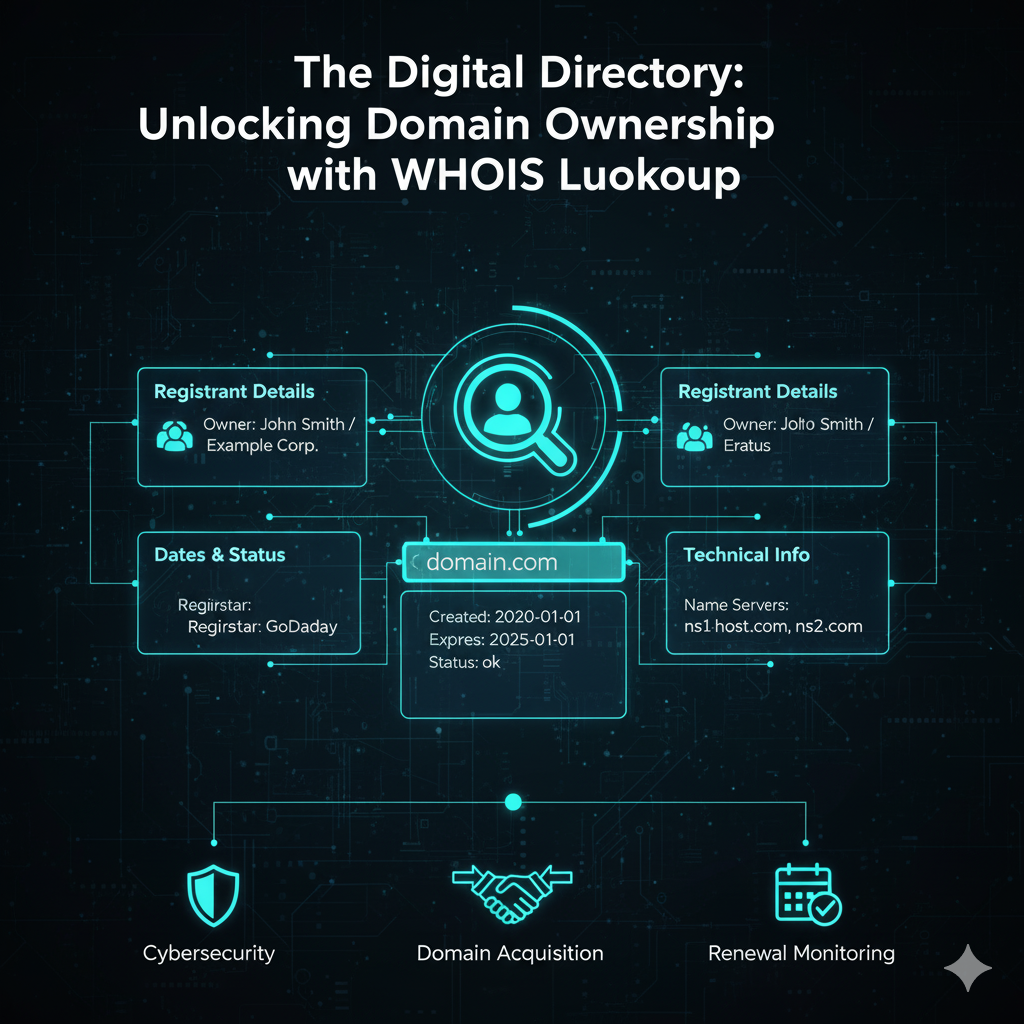
Whois Lookup
Created on 9 October, 2025 • Checker Tools • 99 views • 3 minutes read
A WHOIS Lookup Tool is a utility that retrieves public registration records for a domain name or an IP address. It provides essential administrative, technical, and billing contact information for the entity that registered the domain or IP block. This to
The Digital Directory: Unlocking Domain Ownership with WHOIS LookupThe Phonebook of the Internet: What is WHOIS?
When a person or organization registers a domain name (like example.com), they are legally required to provide contact information to the domain registrar. This public database of contact and technical information is known as WHOIS (pronounced "who is").
The WHOIS system is a global directory governed by the Internet Corporation for Assigned Names and Numbers (ICANN). It was created to promote accountability and transparency on the internet, ensuring that there is always a way to contact the party responsible for a website.
A WHOIS Lookup Tool is the gateway to accessing these records, allowing you to quickly query the appropriate registry database and pull up the details for nearly any domain or IP address.
The Gold Mine of Information in a WHOIS Record
A typical WHOIS record is structured and reveals several key categories of information:
Domain/IP Status & Dates:
Creation Date: When the domain was first registered.
Expiration Date: When the registration is set to expire (crucial for renewal planning).
Last Updated Date: When the domain's information was last modified.
Domain Status: The current state of the domain (e.g., clientTransferProhibited, ok).
Registrar Details:
Registrar Name: The company through which the domain was purchased (e.g., GoDaddy, Namecheap).
WHOIS Server: The specific server containing the authoritative record.
Contact Information (The "WHOIS" part):
Registrant/Owner: The name of the person or organization who legally owns the domain.
Administrative Contact: The person responsible for legal matters and transfers.
Technical Contact: The person responsible for managing the domain's server and technical settings.
Note: Due to GDPR and other privacy laws, much of this contact information is often protected by a "Privacy Protection" service.
Technical Details:
Name Servers (DNS): The servers that point the domain to its web hosting location (e.g., ns1.hostingservice.com).
Essential Uses for the WHOIS Lookup Tool
The data retrieved from a WHOIS lookup is essential for a wide range of professionals and internet users:
1. Due Diligence and Domain Acquisition
Buying a Domain: Before attempting to purchase an already registered domain, a WHOIS lookup can identify the owner (or their proxy agent) and provide the necessary contact method for negotiating a sale.
Checking Legitimacy: If a new business or potential partner seems questionable, checking their domain's creation date via WHOIS can help determine how long they've truly been operating. A site claiming 10 years of experience but whose domain was registered last month is a red flag.
2. Cybersecurity and Incident Response
Reporting Abuse: If you discover a website hosting malware, engaging in phishing, or infringing on intellectual property, the WHOIS record provides the contact details for the Administrative or Technical contact, allowing you to report the abuse directly to the responsible party or their registrar.
Infrastructure Analysis: For security researchers, WHOIS can help link multiple domains to the same owner, revealing patterns or infrastructure related to a specific threat actor.
Investigating IP Blocks: WHOIS is also used to look up IP addresses to determine which organization (often an ISP or a large corporation) owns a specific block of network addresses.
3. Network and SEO Monitoring
Tracking Competitors: Monitoring the expiration and update dates of a competitor's domain can offer small clues about their organizational management or future plans.
Verifying Name Servers: For webmasters, a WHOIS check is a quick way to confirm that the domain is pointing to the correct set of nameservers after a host migration.
Domain Renewal: For your own domains, the expiration date is the most critical piece of data; missing a renewal can lead to the loss of your digital identity.
The Privacy Layer: Understanding Redaction
It is important to note that many domain owners now use WHOIS Privacy Protection (often included free or for a small fee). This service replaces the owner's personal contact details with the contact information of a proxy service provided by the registrar.
While this protects individuals from spam and harassment, the WHOIS service still functions as intended: there is always a verifiable legal entity (the registrar's proxy) that can be contacted regarding the domain.
Conclusion: Transparency in the Digital Age
The WHOIS Lookup Tool is a fundamental utility that brings accountability and structure to the seemingly limitless chaos of the internet. It is a vital resource that empowers users to understand domain ownership, enhance cybersecurity measures, and participate in the governance of the web.
Popular posts
-
DNS LookupChecker Tools • 143 views
-
Number to Word Converter ToolsConverter Tools • 135 views
-
Gravatar checkerChecker Tools • 118 views
-
SSL LookupChecker Tools • 107 views
-
Website hosting checkerChecker Tools • 107 views